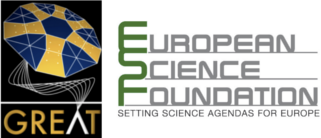The IoA, Cambridge is leading a new EC FP7 Marie-Curie Initial Training Network - GREAT-ITN - with a research theme of 'Unravelling the Milky Way' by better understanding its origin and evolution. The network brings together partners from across Europe (and one node in Beijing, China) - with the aim to exploit the upcoming data from the ESA Gaia mission as applied to our study of the Milky Way. Further information can be found at http://www.great-itn.eu. Across the network, seventeen Early Stage Researchers (ESR) will embark on PhD study programmes addressing a range of specific topics.
At the IoA, Cambridge, there will be two Marie-Curie ESR positions available:
a) Archaeology of the Milky Way: The ESR will lead the in-depth study of the structure of the Virgo over density (VOD), the Hercules-Aquila Cloud (HAC) over densities, and other such structures utilising existent Sloan Digital Sky Survey imaging available at the IoA together with the infrared imaging data acquired as a part of the Monoceros/HAC UKIRT survey, coupled with upcoming VISTA IR data and large scale ESO VLT spectroscopic survey data. Incorporation of the Gaia distances and thus absolute luminosities for many of the stars in the VOD and HAC will give answers as to the origin of these streams, and thus insights into the Milky Way evolution. For further details of this project please contact: Professor Gerry Gilmore (gil@ast.cam.ac.uk) or Dr Vasily Belokurov (vasily@ast.cam.ac.uk)
b) The Transient Sky: Gaia will have a significant impact on our knowledge of the 'transient' sky. Its repeated observations of the sky, typically 100 times, but in some areas up to 250 times, opens up a new discovery space. This topic will focus on the Gaia supernova alerts, and development of a flexible system for discovery and visualisation. The UCAM ESR will work on both the science and technical challenges related to the federation of these alerts. The ESR will utilise new visualisation technologies in the analysis of Type Ia SNe and micro-lensing events. The large sample of SNe Ia observed by Gaia before maximum, coupled with carefully planned follow-up observations, will give insight about the explosion mechanism from the analysis of the rapidly changing spectra shortly after explosion. Additionally, in advance of Gaia data, the research will exploit current wide area imaging and spectroscopic surveys of the Milky Way (e.g. those carried out on the ESO VISTAand VLT telescopes), assessing transient populations in those data. For further details of this project contact Dr Nicholas Walton (naw@ast.cam.ac.uk) or Dr Mike Irwin (mike@ast.cam.ac.uk).
The successful candidates will be expected to embark on a PhD programme of study. The ESRs will undertake one or two short term secondments to other nodes in the network - including one of the industrial partners - the World Wide Telescope team at Microsoft Research, Redmond, WA, USA.
For further information contact the network coordinator - Dr Nicholas Walton (naw@ast.cam.ac.uk or Tel: 01223 337503). For further details concerning GREAT - see http://www.great-itn.eu.
The IoA, Cambridge page at http://www.ast.cam.ac.uk/teaching/postgrad gives full details of the application procedure which should be followed in making your application - in particular the 'Application Procedure 2011' section
Important Eligibility Information concerning ESRs:
Early-stage researchers are those who are, at the time of selection by the host institution, in the first four years (full time equivalent) of their research careers. This is measured from the date when they obtained the degree which formally entitles them to embark on a doctorate, either in the country in which the degree was obtained or in the country in which the research training is provided, irrespective of whether or not a doctorate was envisaged. Researchers are normally required to undertake trans-national mobility (i.e. move from one country to another) when taking up their appointment. One general rule applies to the appointment of researchers in a network:At the time of selection by the host organisation, researchers must not have resided or carried out their main activity (work, studies, etc.) in the country of their host organisation for more than 12 months in the 3 years immediately prior to their recruitment. Short stays, such as holidays, are not taken into account. As far as international European interest organisations or international organisations are concerned, this rule does not apply to the hosting of eligible researchers, however the appointed researcher must not have spent more than 12 months in the 3 years immediately prior to the selection by the host organisation in the same appointing organisation.

